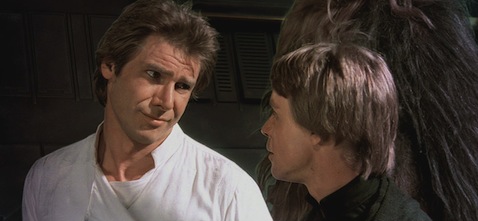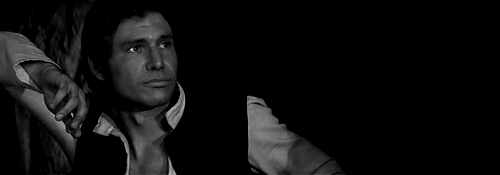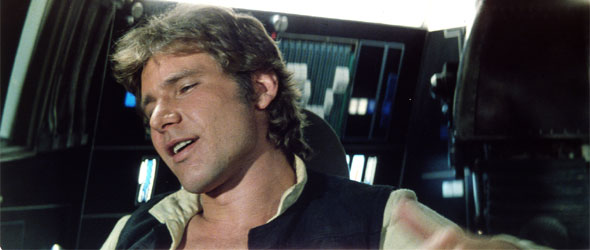We’ll never really know if it was the money or a mind-trick that convinced Han Solo to ferry Luke, Obi-Wan, and the droids to Alderaan, and the riddle of the actor who played Solo for three movies is equally unclear. Fittingly, or jarringly, Harrison Ford’s relationship with Star Wars is exactly like his character; always picking “Should I Stay our Should I Go,” by the Clash as his karaoke song with one boot out the door. Ford almost wasn’t in The Empire Strikes Back and wanted Han to die in Return of the Jedi. And now that he’s in Episode VII, flippant rumors are circulating that he’s the co-lead, along with two of the younger actors.
But none of this should come as any surprise, because Han Solo has always been the lead of the classic Star Wars films.
But wait! Isn’t Luke Skywalker the main character of Star Wars? And isn’t the entire saga—including the prequels—the story of the Skywalker family? Well, yes, on paper, that’s true. But they don’t have have paper in Star Wars anyway and a Skywalker-centric story is part of a retroactive way we’ve all come to view the saga. It’s fairly well-documented that Lucas started using this sort of language to redefine the story only at the point at which he was writing the prequels, and previously, in a eureka moment when he randomly decided Darth Vader was Luke Skywalker’s father while writing The Empire Strikes Back. These components are certainly part of what make Star Wars the Star Wars we know today, but really—and this truth might hurt—no one would like Star Wars without Han Solo, and I don’t even need to use the prequels as proof.
If Princess Leia is the person who embodies the ideals of the Star Wars conflicts (i.e. she IS the Rebellion) and Luke Skywalker is the outsider getting caught up in those ideals that already jive jibe with his personality, then Han Solo is the person who is literally questioning why any of it is important at all. When he says “I ain’t in this for your revolution, and I ain’t in it for you princess, I expect to be well paid. I’m in it for the money!” he could be metaphysically speaking for someone other than the character. Star Wars is populated by psychological archetypes anyway (Obi-Wan is the worrying conscience of story, Darth Vader is that existential fear of becoming an amoral jerk personified.) so it’s not too much of a stretch to take Han’s statement about self-preservation and apply it to the real world context the movie lives within as well as the story that the character of Han lives within. So why do we connect with the story of Star Wars and how does Han help us do that?
I think Han is speaking for a larger, sort of jaded, constantly underwhelmed audience. Because if you’re watching Star Wars for the first time, he’s the reality check on “hokey religions and ancient weapons.” For a good many of us who love fantasy already, Star Wars is already great—it has lightsabers, space travel, and magic—but Han’s skepticism widens the scope of the audience beyond that. A fantasy audience generally wants to be unquestioning, because it likes this kind of story, but a more general audience needs to be convinced and the presence of Han inside of this narrative allows Star Wars to be both fantasy and pop at the same time. Because he’s an outsider and iconoclast inside of a universe in which he exists, he replicates the experience of how a lot of people are confronted with art; they feel like it’s not for them and have to be convinced otherwise. When art can bridge audiences like this and blend genres, it generally means it ceases to be a genre and becomes pop culture and both Han Solo and Harrison Ford embody this duality.
In the first 20 minutes of The Empire Strikes Back, you see Han Solo’s face more than you see Luke Skywalker’s. Throughout the rest of the film, equal time is divided among Luke’s journey and what’s going on with Han and Princess Leia. The obvious argument for the equal face-time is that it is the middle chapter of Star Wars and we’re dealing with an ensemble, and while that’s also kind of true, it feels like Han is the one making the most interesting decisions. Again, why are you watching this movie? Is it because you’re interested in seeing what happens to a whiny twenty-something who is trying to find himself? Or are you really into this wise-cracking, more-intelligent-than-he-lets-on guy, who might just have to clean up his act before shit hits the fan?
I’ve written before (with Emmet Asher-Perrin!) about how Han Solo is the most realistic person in Star Wars, and I stand by that. Han has debt. Han has a crappy past. He has cool and not-so-cool friends. The self-esteem of Luke and Leia is on full display in all three films, and guess what? It’s healthy. Han Solo, in contrast has something almost every character in Star Wars lacks: confidence issues. Because if you think someone who flies their spaceship into an asteroid field on purpose or runs at bunch of bad guys “certainly has courage,” then you’re missing what it means to be a person. Han Solo is courageous not because he’s cool, but instead because he’s screwed-up. And so am I and so are you. The other characters know this, which is why the entire opening of Return of the Jedi is spent rescuing Han Solo from Jabba the Hutt.

Han Solo is the audience, sitting there MST3K-ing the events in the movie as they are happening. “I’m out of it for a little while and everybody gets delusions of grandeur!” At this point in Return of the Jedi, Han is basically saying, “Every single person in this movie is insane, can you believe all these people?” In part, this embedded criticism of Star Wars is what makes the whole of Star Wars easier to deal with for non-fantasy/sci-fi fans, but less reductively, and more accurately, it just makes it all more fun. If the secret main character of Star Wars doesn’t take things too seriously, or questions why any of this is happening, we buy it more.
We love rogues and renegades who boast they don’t give a shit about anyone because in a piece of fiction, we can smell the irony on that statement a parsec or twelve away. The only reason to have a supposedly aloof character in your story is to have them overcome their apathy in a way that makes them more than ordinary, and instead, something spectacular. We all relate to the moment when Luke stares off into the suns setting and dreams of his super-amazing life, to the point where we can almost see a cartoon thought bubble forming over him, in which he rescues princesses and saves the day. But this sort of wish-fulfillment is rare in real life, and, in the aggregate, less relatable. Unlike Luke or Leia (or Anakin?) Han doesn’t have to live up to his potential to achieve a greater destiny, and no one is expecting him to, which is exactly what anyone trying to do anything cool grapples with.
So, everyone’s heard the axiom about “greatness” and I guess I’d like to amend that. Some are born great, some have greatness thrust upon them, and some, maybe the rest of us, are Han Solo. And that’s why he has been and should be the lead in Star Wars.

Ryan Britt is a critic, essayist and fiction writer living in New York City and is longtime contributor to Tor.com.










